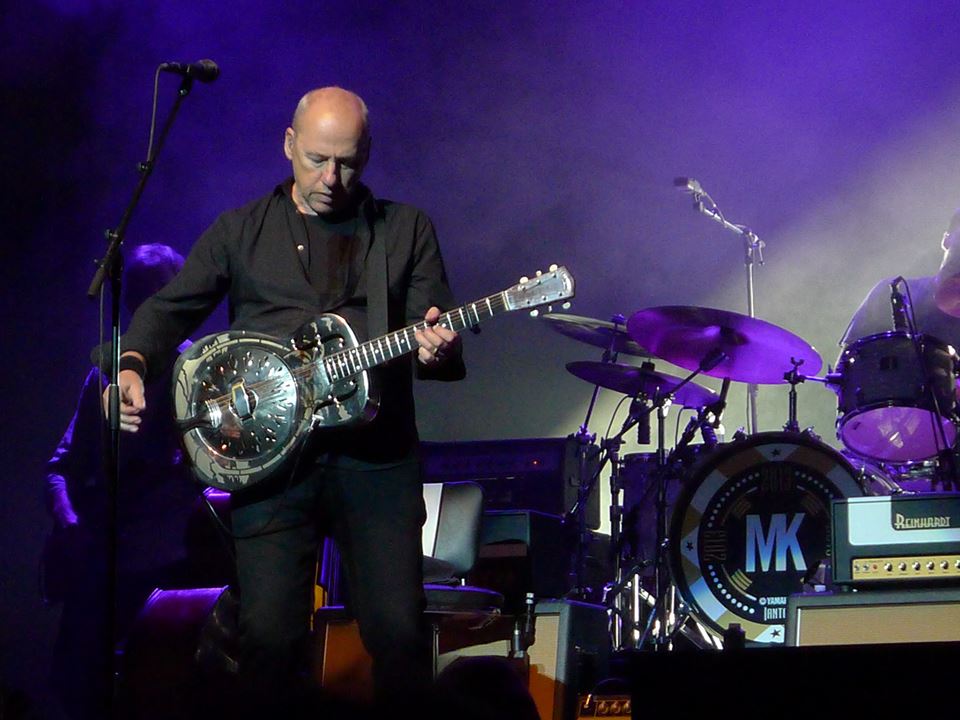
Saturday night at the sold-out, stately Wiltern Theater in Los Angeles, and Mark Knopfler did not play his biggest hits. Despite scattered, shouted pleas from the boisterous audience, there was no “Sultans of Swing.” No “Money for Nothing.” No “Brothers in Arms.” It’s not to say he or his seven-piece band of ace musicians, whose multi-instrumental expertise ranged from fiddle and flute to pennywhistle and bagpipes, could not have delivered rousing versions of the chart-toppers from Knopfler’s Dire Straits days had they chosen to do so. Judging by the passion and precision of the two-hour performance, anything this unit tackled would’ve wowed.
On night three of a short five-show West Coast jaunt, (one Las Vegas and four California dates), the veteran guitar player’s set was heavy with material from his recent solo efforts, notably from his Privateering double album, finally released in September in the U.S. following a split with his longtime label Warner Bros. a year after the European issue. A duo of chestnuts from the Straits days, “Romeo and Juliet,” and “Telegraph Road,” were sprinkled in for good measure, but reflected the songwriter’s current pastoral leanings rather than pub rock punch. Knopfler has always been a keen observer of the world he inhabits, his compositions more vignette than pop song, and the cinematic sweep of entries like “Hill Farmer’s Blues,” “Postcards from Paraguay,” and “Marbletown,” were ideal in showcasing the immense talent of his supporting cast, all dressed in workmanlike denim and button-downs, and on this occasion included fellow countryman saxophonist Nigel Hitchcock who guested on a rollicking “I Used to Could,” stuck around for “Romeo,” and rejoined on the “Going Home: Theme from Local Hero” encore.
While Knopfler’s studio output of late seems concentrated less on guitar workouts and more on songcraft, in concert he still burns up the fretboards. From boogie-woogie bottleneck whines on “Corned Beef City,” to the crunching power trio riffs of “Song for Sonny Liston,” his fingerpicking mastery in near motionless repose commands the center stage spotlight. He’s eager to share it, though, offering ample space for Jim Cox’s sparkling keyboard runs and the opposing forces of Mike McGoldrick’s whistle and flute and John McCusker’s fiddle, alternately corralled and propelled by the drumming of Ian Thomas. His longtime core corps of keyboardist and Straits holdover Guy Fletcher, session vet Richard Bennett on guitar, and bassist Glenn Worf allowed Knopfler the confidence and space to elevate his magnificently melodic solos as on opener “What it Is” and the extended piece “Speedway at Nazareth.”
Even into his fifth decade in rock and roll, Mark Knopfler finds himself in the middle of a very prolific songwriting period. While some of his peers trek their nostalgia-soaked shows around this country’s sports arenas and stadiums, his theater appearance instead resonates as evolutionary. He could no doubt load up the list with fan favorites, resurrect the headband, and fill venues five times the size of the Wiltern, but he looks rather content with leaving that comfortably in the past. For a grateful and raucous Southern California crowd able to see and hear these brilliant players in such intimate confines, it was a superb decision.


No Comments comments associated with this post